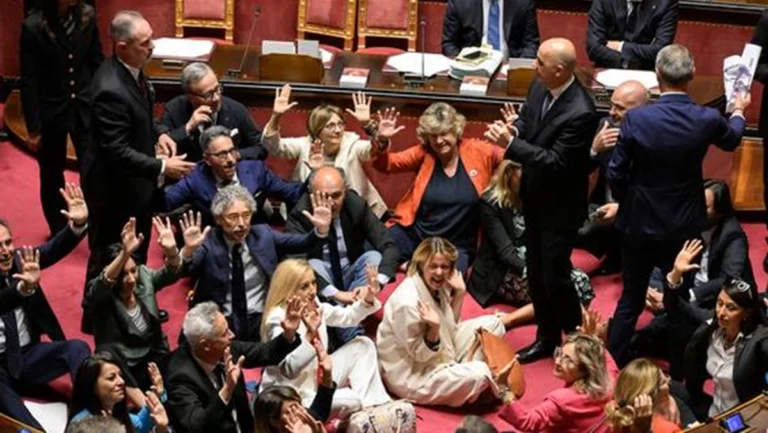Italian Parliament Approves Meloni’s Controversial Security Law

Opposition legislators protest by sitting in front of the government benches, June 4, 2025. X/ @SaCe86
June 4, 2025 Hour: 9:57 am
Previously, more than 10,000 people protested in Rome, holding signs that read ‘Raise Your Head against the State of Fear.’
On Wednesday, the Italian Parliament approved a controversial security law promoted by Prime Minister Giorgia Meloni. The legislation, which has faced strong criticism in recent months from opposition parties, labor unions and numerous organizations, passed with 109 votes in favor, 69 against and one abstention.
RELATED:
Meloni and Macron Hold Talks in Rome
The bill reached the Senate after it was passed in the Chamber of Deputies through a confidence vote — a common tactic in Italy’s legislative process to speed up approval by bypassing the debate on amendments proposed by the opposition.
Before the Senate vote, lawmakers from the Democratic Party (PD), the Five Star Movement (M5S), and the Green and Left Alliance (AVS) protested by sitting in front of the government benches shouting, “Shame, shame,” while demanding a meeting of the parliamentary group leaders.
Senate President Ignazio La Russa temporarily suspended the session and met with some party representatives before resuming the proceedings with the confidence vote that led to the approval of the decree. The party of former Prime Minister Matteo Renzi, Italia Viva, did not take part in the protest.
The text reads: “The Security Decree doesn’t stop the protests. Today, actions will be held in 12 cities to demand the elimination of VAT on essential products. If the government continues to ignore the crisis we are experiencing, we will respond with a massive boycott. Join us too!”
Among other provisions, the law introduces new categories of terrorism offenses and stiffens penalties for prison riots, illegal occupation of property, and acts of civil disobedience such as road blockages. It also establishes a new crime of unlawful property occupation and allows judicial police to order the immediate evacuation of the property — even without a court order — in cases of illegal squatting.
One of the most controversial elements of the law is the removal of the requirement to postpone sentences for pregnant women and mothers with young children.
“Strengthening police tools is a decisive step toward protecting citizens… Legality is the foundation of freedom, and we will continue to defend it,” Meloni said following the law’s approval.
The law also increases criminal protections for law enforcement officers, raising penalties for assault, resistance, and violence against public officials. It introduces an aggravating circumstance when such acts are committed against members of the judicial or public security police.
The text reads, “The Meloni administration legalizes state terrorism. Article 31 of the security decree, or rather, the repression decree, is perhaps the worst of all. It regulates the secret services and, in fact, legalizes state terrorism. We are talking about the possibility that, with the Prime Minister’s signature, a secret service agent could create and direct terrorist organizations for the purposes of both international terrorism and subversion of the democratic order, and could manufacture and possess explosive material. This is absolutely serious in the country of the massacres of Ustica, Bologna, Piazza Fontana, and Piazza della Loggia, the anniversary of which was celebrated yesterday. The families of the victims of the massacres were precisely the first to denounce the provisions of a measure that represents the most significant authoritarian turn of the Meloni administration. Such a serious article could not even be debated because the government placed its trust in the decree and prevented parliamentary debate and amendments. So I presented a motion, but the government also opposed it. A real indecency.”
The legislation authorizes the use of body cameras by police during operations and provides financial assistance of up to 10,000 euros for legal expenses incurred by officers facing criminal proceedings related to their duties.
The new law toughens penalties for those who exploit minors for begging or commit fraud. It also strengthens measures against scams targeting the elderly, introducing a specific offense of aggravated fraud with penalties ranging from two to six years in prison and fines between 700 and 3,000 euros.
On Saturday, more than 10,000 people protested in Rome against the decree, holding signs that read “Raise your head against the State of Fear” and “Meloni, go away,” while chanting, “Faced with a fascist government, until victory.”
“This decree is pure propaganda… It’s not about more security, but more repression,” said Elly Schlein, secretary of the PD, the largest opposition party.
teleSUR/ JF
Source: EFE






